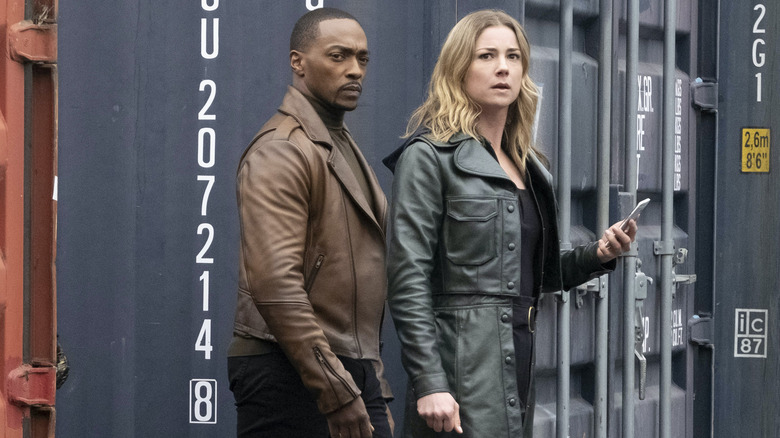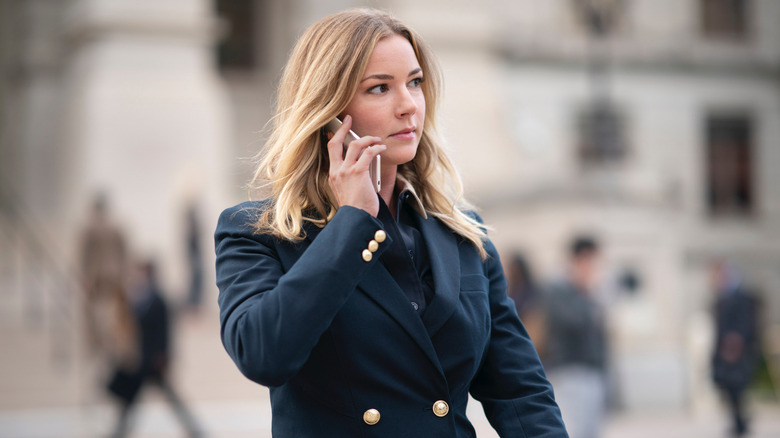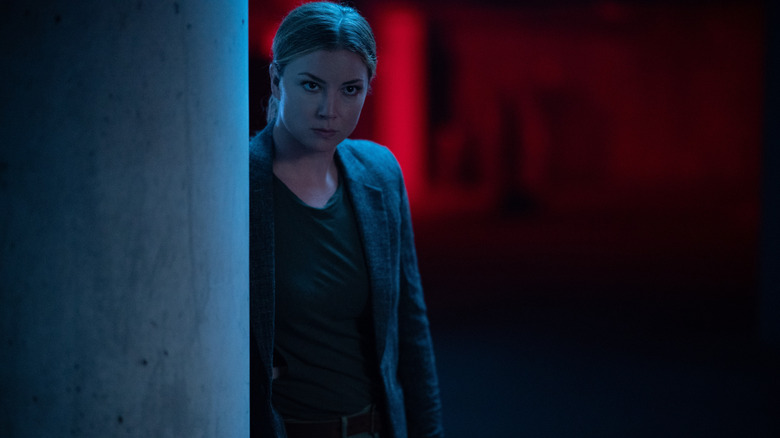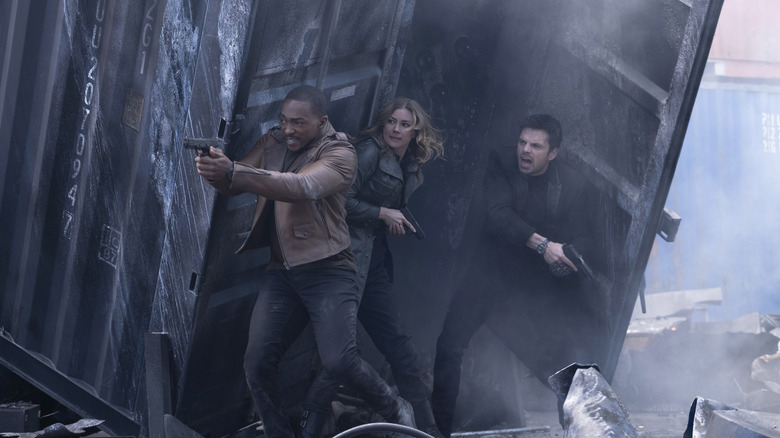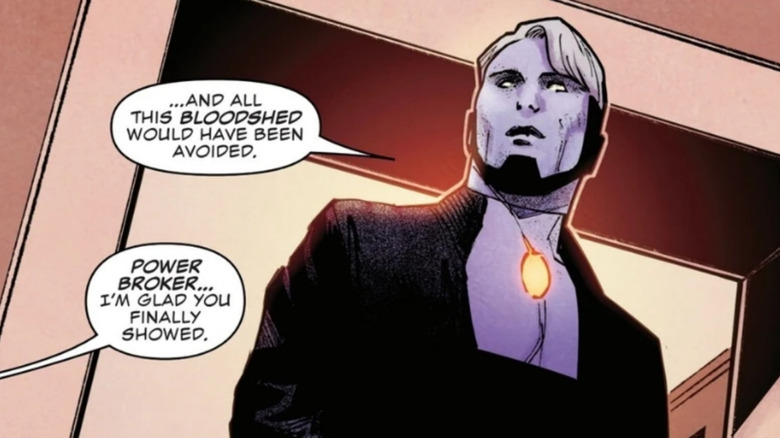Who Is The Power Broker? Marvel's Falcon And The Winter Soldier Villain Explained
A power broker is generally known as a person who can unofficially, often from the shadows, decide the way power flows within a large group of people. The term is most famously used to describe Robert Moses, an urban planner who was never officially elected to office yet nevertheless wielded enormous amounts of power throughout New York City. On paper, he was less powerful than the New York mayors and governors that came and went throughout his career, but in practice, they were terrified of him.
Shortly after "The Power Broker" (a 1,000+ page tell-all about Moses' many nefarious deeds) was published in 1974, Marvel Comics came up with a character with the same title. Indeed, a 1978 issue of the comic "Machine Man" introduced a mysterious individual known as The Power Broker. Then, in 2008, another person took up the title in the comic "Avengers: The Initiative."
13 years later, the 2021 Disney+ mini-series "The Falcon and the Winter Soldier" introduced the idea of a mysterious Power Broker who was running the fictional city-state of Madripoor in the Marvel Cinematic Universe. When the show's third episode, titled "The Power Broker," debuted, the Marvel subreddit was filled with theories over who it could be. The most popular one turned out to be correct: Sharon Carter (Emma VanCamp) was, in fact, the Power Broker, which makes sense given the title of the episode she was reintroduced in. But how did Peggy Carter's kindhearted grand-niece end up in such a dark role? Well, it's complicated...
Sharon Carter is the Power Broker in the MCU, but how?
The moment Sharon was re-introduced in "Falcon and the Winter Soldier," it was clear this was a different Sharon than we were used to. Sharon was one of those characters who got sadly lost in the shuffle throughout "Avengers: Infinity War" and "Avengers: Endgame." Most fans assumed she had been "dusted" during the Blip like half the MCU's cast was, but it turned out she was still very much alive and hiding out in Madripoor.
Why was she hiding there? Well, because she was considered a fugitive for helping out Steve Rogers (Chris Evans) in "Captain America: Civil War." Although all the main superheroes on Team Cap were eventually pardoned, nobody bothered to pardon poor regular-human Sharon. For five years, she was essentially left behind — not just by the narrative but also Rogers himself. Sharon's updated backstory in "Falcon and the Winter Soldier" is intended to once again complicate the legacy of Captain America, seemingly for the sake of giving Sam Wilson (Anthony Mackie) more to struggle with while trying to decide if he should take up the mantle.
However, as we discover in the "Falcon and the Winter Soldier" finale, it's also there to set up Sharon's villain arc. Her experience being exiled by her own nation and seemingly forgotten by her heroes has changed her forever. Not only is she a darker, more bitter character throughout the show than she ever was in the prior "Captain America" films, but in the finale she's also revealed to be the Power Broker. In other words, Sharon is the ruler of Madripoor's criminal underworld and is going to use her newfound pardon to sell U.S. government secrets to other bad guys across the globe. Frankly, it's a bad look.
How do fans feel about the Sharon Carter reveal?
The larger consensus around Sharon's big reveal is that it was disappointing. Sharon is the grand-niece of Peggy Carter (Hayley Atwell), a beloved character in the Marvel fandom, so the reveal that she's gone to the dark side feels like a stain on Peggy's legacy. Her new Power Broker role was also criticized for feeling rushed; it may make sense that she'd have changed so much over a five-year time jump, but because viewers hadn't actually gotten to watch her evolve, the whole thing feels underdeveloped. It's similar to the complaints fans have levied at "Doctor Strange in the Multiverse of Madness," which had Wanda Maximoff (Elizabeth Olsen) turn a little too villainous too quickly.
Evil Sharon could've worked if we'd seen the transformation in real time, fans have argued, but instead we had to accept that the most interesting journey the character has gone through happened entirely off-screen. It felt so jarring that, when "Secret Invasion" came out two years later, fans were hoping the show would reveal that Sharon had been body-swapped by Skrulls, much like Rhodey (Don Cheadle) was. As /Film's own Margaret David put it in her list of most disappointing MCU characters:
Turning Sharon into a traitorous girlboss, an apex white woman richly ensconced in a troubled Asian city-state, isn't fun. We've got enough "role models" like that in real life, like Theranos founder Elizabeth Holmes. Save our Sharon, Marvel. Bring her home when the 'Secret Invasion' winds down.
Some fans, however, have come around to the twist. New evil Sharon may not be as pleasant to watch as old nice Sharon was, but she is at least more interesting overall. Some fans have argued that it's actually more respectful to the character for her years of exile to have changed her as dramatically as it has because it shows that at least she can't be cast aside by our heroes without consequences. If she'd suffered quietly and returned from her five years of exile the same good person we remembered her as, this might've flattened her as a character and let Rogers off the hook. It would've also contributed to the fandom impression that Sharon's just a less compelling Peggy Carter.
Where will the MCU take Sharon Carter from here?
The other benefit of Sharon's Power Broker reveal is that if the MCU ever decides to bring her back, it's a lot clearer what her purpose in the story will be. Rather than being stuck in a sidekick helper role, Power Broker Sharon will likely get to be a villain (or at least an unpredictable agent of chaos). We'll also get to see how she handles having an Avenger as an enemy, as well as, potentially, more backstory diving into how, exactly, she got to this point.
As someone who's loved VanCamp in her ABC series "Revenge," where she played a cool yet coldblooded Machiavellian schemer, I have no doubt she can pull this sort of storyline off. Indeed, VanCamp is at her most interesting as an actor when she's allowed to be devious (something her early "Captain America" appearances denied her).
When asked about Sharon's role in the MCU going forward, "Falcon and the Winter Soldier" co-executive producer Zoie Nagelhout explained:
"The conflict doesn't really involve Sam and Bucky; she's not out to get the two of them. She's on her own path, her own mission. It wasn't necessary to have to complicate her relationship with those guys. She can help them and also be the Power Broker. It was interesting to us that there be duality in the character."
In the same interview, VanCamp teased her character's future:
"[Sharon] has a much bigger plan and it's not for the greater good like it used to be. As the person playing the character, I understand that perspective; she doesn't trust the government anymore and she wants to stick it to them a little bit. What that all means? I don't know. We'll see."
Who was the Power Broker in Marvel's comics?
Although the title of the Power Broker appears in Marvel's comic books, there's not really a clear counterpart to Sharon there. Published in 2007, "Avengers: The Initiative Annual #1" features a version of the Power Broker in the form of a businessman who gives people powers in exchange for a cut of the profits they make with said super-abilities. He even creates an app called Hench, which allows other businessmen to hire the supervillains he's imbued with super-powers.
The earliest comic book iteration of the Power Broker was Curtiss Jackson, who was introduced in "Machine Man" issue #7 and would sell the serum that created Captain America for a heavy price. Jackson eventually used the serum on himself, only to transform into an unfortunate monstrosity. He did eventually regain his normal body, but his experience did not change his villainous ways. Between these two Power Brokers, it's clear that the Power Broker in the comics is just a title, much like Captain America. Killing them would only mean another person would go on to take their place.
Jackson was eventually killed in Marvel's comics by the Punisher, a fate that is still technically possible for Sharon Carter's Power Broker in the MCU. That's unlikely, however; whereas Sharon seems motivated largely by anger, Jackson's Power Broker was driven almost entirely by greed. Sharon may bear the title of a villain, but she otherwise has so little in common with them that she's probably not going down the same route. Rather, her future is looking dark at the moment, yet, unlike the Power Brokers that've come before, redemption remains a possibility.
